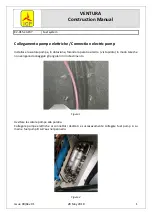
STEP 3. SETTING UP YOUR BAR AND LINES
Starting at the kite, unwind your flying lines while walking upwind backwards.
Place your bar on the ground the correct way around. Make sure your leader
lines and other parts of the bar are free of tangles or twists. Hold your lines
between your fingers while walking back toward the kite, to sort out the flying
lines. Make sure the lines are lying next to the kite, on the side of the trailing
edge.
To ensure that your lines are attached correctly, without twists or tangles, you can use the following method:
First attach the rear line to the
upwind tip.
Now attach the top line to the
upwind tip, taking it
over
the rear line
you have just attached.
Attach the rear line to the downwind
tip. You are now ready to move on to
the next step.
Take the other top line and attach it
to the downwind tip, passing it over
the kite.
Attaching the top lines to the kite
Make sure you attach your
lines using a larkshead knot. Place a larkshead
knot in the flying line connector, slide it over the knot on the end of the top line
attachment and tighten the larkshead as shown.
Attaching the rear lines to the kite
Connect the flying line connector to the rear line attachment and tighten the
larkshead as shown.
VPC SYSTEM
VPC SYSTEM
FLYING LINE
FLYING LINE
FLYING LINE
FLYING LINE
FLYING LINE
FLYING LINE
VPC SYSTEM
VPC SYSTEM
VPC SYSTEM
VPC SYSTEM
SECONDARY QUICK RELEASE
In case you completely want to disconnect yourself from the kite, you can activate the secondary quick release afterwards.
STEP 3. CHECKING YOUR SAFETY SYSTEMS
Before launching your kite always check if your primary and secondary safety releases function properly.
The Navigator control bar has a primary release on the depower loop. After activating the release, the kite is only supported by the safety line .
Re-connecting the primary safety release
Activating the primary quick release
Activating the secondary quick release
Re-connecting the secondary quick release
Re-connect the primary safety release by placing stainless steel ring on the end
of the depower loop tube into the Centrix push-away center piece and behind
the hook on the pin inside the center piece. Then push the pin into the center
piece and lock it in place by sliding the release cuff back down.
Always make sure all parts are free of sand and/or snow before re-connecting
your safety system.
To activate your primary quick release, push the release cuff part towards the
kite.
To activate your secondary quick release, move the red release in the direction
of the arrows.
Re-connect the secondary safety release by placing the loop over the stainless
steel pin, folding the pin down and sliding the relaese cuff back in place. Make
sure the release cuff is sitting right against the ball after reconnecting.
Summary of Contents for Twinskin
Page 1: ...FOR TWINSKIN KITES...
Page 20: ......




























